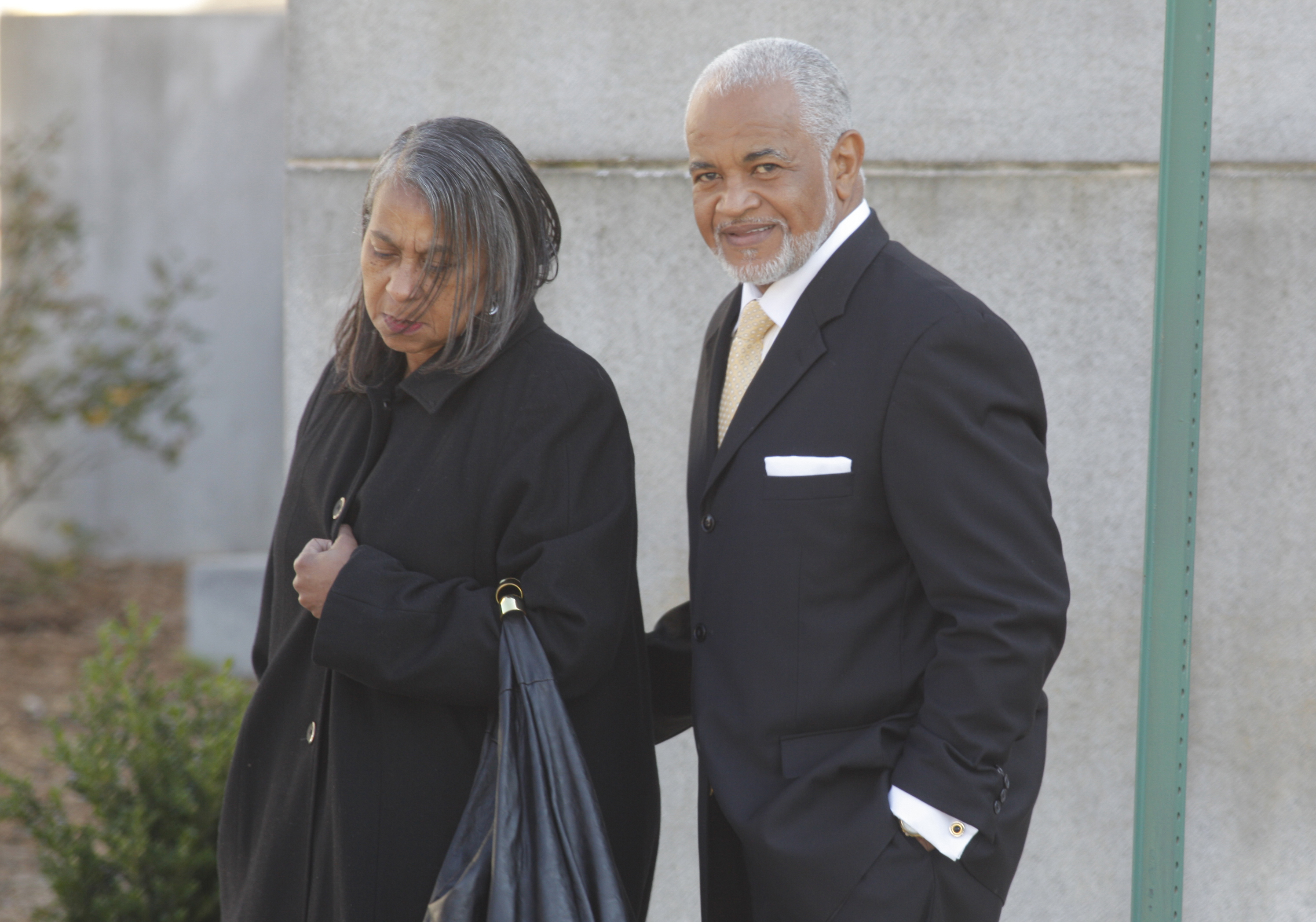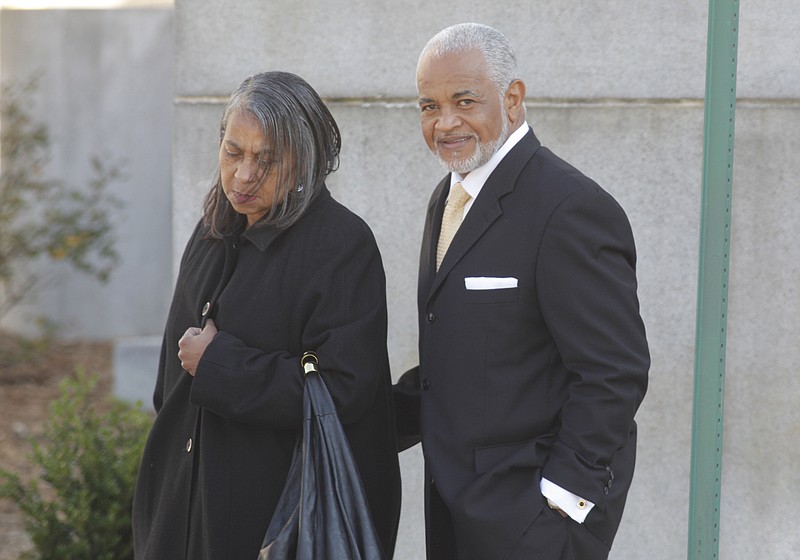 James Mathis, accompanied by his wife, leaves the Federal Courthouse on Friday afternoon. Mathis, along with Donald Fillers and David Wood, is facing charges related to violations of the Clean Air Act. The 11-count indictment, which also names two associated corporations, charges the men with crimes related to asbestos removal and demolition.
James Mathis, accompanied by his wife, leaves the Federal Courthouse on Friday afternoon. Mathis, along with Donald Fillers and David Wood, is facing charges related to violations of the Clean Air Act. The 11-count indictment, which also names two associated corporations, charges the men with crimes related to asbestos removal and demolition.The defendants charged in a federal case alleging improper asbestos removal -- and their jury -- have all weekend to think about their pending verdict.
After two days of closing arguments from six attorneys, the jury began deliberating at about 1:30 p.m. Friday in the cases Don Fillers, James Mathis and David Wood. At 5 p.m., U.S. District Judge Curtis L. Collier sent the jurors home and told them to come back Monday.
Fillers, Mathis and Wood are accused of conspiring to defraud the government and violate the Clean Air Act by demolishing the Standard Coosa Thatcher plant while it still contained asbestos, leaving the block littered with dusty and contaminated debris.
In the government's argument, U.S. Assistant Attorney Matthew Morris and Todd Gleason, attorney for the U.S. Department of Justice's environmental crimes section, told jurors the case is about greed.
"Their plan was make money," Gleason said.
But when a certified asbestos survey estimated a removal cost at more than 10 times the $20,000 price tag the former plant owner told the Fillers to expect, the $600,000 profit they hoped for began to shrink.
"More than a third of the potential profit was going to asbestos. Folks, that's your motive," Gleason said. "So they decided to do it on the cheap."
Fillers and his brother, Gary Fillers, planned to salvage wood for Don's hardware and wood business, then sell or develop the property. Wood, the Fillers' hired hand, was to receive a cut of the salvaged material, including metal pipe. Mathis was the demolition contractor, whose work was not supposed to begin until all the asbestos was properly removed from the plant.
Rejecting bids that halved the price of the certified survey estimate, Fillers ultimately hired an asbestos removal contractor to do a partial asbestos removal for $28,000. That contractor testified he was hired to work only in the plant's boiler room. He said Wood prevented him from seeing other areas of the darkened plant.
Follow @SportsChattGleason also attacked the defense strategy of trying to blame regulators with the Chattanooga Hamilton County Air Pollution Bureau.
"That's like bank robbers blaming security guards because they didn't stop them," he said.
But defense attorneys told the jury that the key word they should remember is "knowingly." They said their clients did not knowingly break the law.
Martin Levitt, defending Fillers, cast Gleason as a fast-talking "lawyer from Washington.
"He told you to look at the figures [on the contract documents]. Well, figures lie and liars figure. You've got to have proof beyond a reasonable doubt."
Levitt questioned the motives of government witnesses, including Gary Fillers, who testified he faced the same allegations but pleaded guilty months ago to avoid the possibility of going to jail.
"What do you do if you're Gary Fillers and your wife can't feed herself or dress herself?" Levitt asked the jury.
Eugene Shiles, defending Wood, asked why Wood would have lived at the plant and worked in the salvaging operation without a mask or protective clothing if he believed it contained asbestos.
"I don't think the government's theory of 'on the cheap' works for David Wood," Shiles said. "He had a big incentive to do it right."
Hallie McFadden, defending Mathis, seized on the government's "expert" witnesses who all said they could not tell if a material contained asbestos without laboratory testing.
"They can't tell if it's asbestos but Mr. Mathis should be able to tell it just by looking at it?" she challenged.
McFadden also reminded jurors that Mathis' brother, son and son-in-law worked with him on the project.
"Do you really think Mr. Mathis would knowingly expose himself and his family members to asbestos?"
Gary Humble, defending Watkins Street Project LLC, the Fillers' company, attacked the government's witnesses.
"Nobody has an obligation to put on unbelievable witnesses and ask you to believe them," Humble said. You wouldn't make important decisions about your family based on what these witnesses said."
Prosecutor Matthew Morris, who had the last word because the government -- not the defense must prove the case -- told jurors that defendants chose the witnesses by hiring them or dealing with them.
Morris also told jurors the law doesn't allow the defendants to bury their heads in the sand and pretend not to know there was an asbestos hazard in the plant. They heard from the previous owner that there was asbestos, and they had paid for a survey that showed far more asbestos all over the building than they ultimately had removed in just one room.
"Let's look at what the liars figured," Morris said, rephrasing a line from defense attorneys. "The liars figured that they wouldn't get caught."
